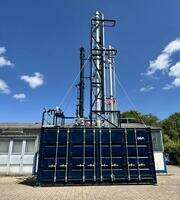- EEW acquired a mobile test plant from GEA for CO₂ capture, operational from summer 2025.
- The test plant will initially be used in Delfzijl, Netherlands.
- EEW seeks regulatory support for CO₂ transportation, storage, and use.
- GEA's solutions include CO₂ conversion to methanol and other chemical precursors.

Strategic Partnership for CO₂ Capture
EEW Energy from Waste and GEA have formed a strategic partnership to advance CO₂ capture technologies. The collaboration aims to test and develop innovative CO₂ capture processes for industrial-scale application. A mobile test plant, acquired by EEW from GEA, will be operational from summer 2025, starting in Delfzijl, Netherlands. This plant will provide insights into the efficiency and integration of CO₂ capture within existing waste recycling processes.
Regulatory Framework Needed
Despite technological viability, large-scale CO₂ capture projects face hurdles due to the lack of a reliable regulatory framework in Germany. EEW emphasizes the need for clear rules on CO₂ transportation, storage, and use to enable economically viable investments. The company calls for the new federal government to establish a framework that supports CO₂ capture infrastructure, including a pipeline network and start-up funding for pioneering projects. Capturing and storing biogenic CO₂ emissions could significantly contribute to national climate targets by producing negative emissions.
GEA's Carbon Capture Solutions
GEA offers comprehensive carbon capture solutions, including gas purification, heat extraction, and CO₂ separation to liquefaction. These solutions aim to reduce CO₂ emissions and enhance energy efficiency. Options for decoupling thermal energy allow for self-generated electricity, further reducing carbon footprints. Additionally, GEA's solutions enable the conversion of CO₂ emissions into valuable products like methanol and other chemical precursors, supporting both Carbon Capture Utilization (CCU) and Carbon Capture Storage (CCS). The modular design of GEA's plants allows adaptation to industry-specific requirements, facilitating the integration of carbon capture technologies across various sectors.

